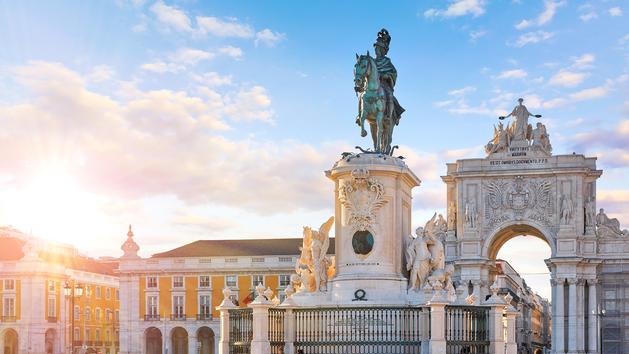In Portugal, this moment was eagerly awaited. This July 1, the country reopens officially and without restrictions its land border with its big neighbor, Spain. Since midnight yesterday, therefore, tourists and the hundreds of thousands of Portuguese emigrants in Europe can now travel to the country by road without constraint for their holidays, crossing the Iberian Peninsula. Air travel from France was already possible since mid-June to the country's main airports (Lisbon, Porto or Faro).
Read also: Holidays in Portugal: why all borders will not be reopened before July 1
"In the north of the country, traders counted the days," reports the Lusa news agency. All are impatient to "resume the centuries-old bond that unites them to Galicia and Spain, and to revive their economic activity."
For the occasion, the authorities of the two countries decided to mark the coup, much further south. Portuguese President Marcelo Rebelo de Sousa and King Felipe VI, but also Prime Ministers António Costa and Pedro Sánchez will pose for the photo this Wednesday morning on the bridge that spans the Caia River, between the village of the same name and Badajoz, at 220 km east of Lisbon.
A symbolic and promising turning point for tourism professionals in Portugal, who despair of seeing foreign customers return. The country's only land border has been closed for fifteen weeks, since March 16, the evening of the first death caused by the Covid-19.
Read also: Summer holidays: country by country, update on border reopening within the European Union
What is the health situation in Portugal? 19 partially reconfigured districts of Lisbon
For the past few days, the entire tourism sector, on which one in ten Portuguese workers depend, has experienced a nightmare. The reason ? The resurgence of the coronavirus epidemic in the Lisbon region, and what many professionals consider to be exaggerated media treatment. Contrary to what has sometimes been announced, "no closure or quarantine measures have been put in place in Lisbon" , and even less in the rest of the country, insists the National Tourist Office.
Read also: Where to go on vacation this summer? European Commission launches website to help tourists
"No health chaos threatens Portugal, as it is suggested abroad", annoys Jorge Beldade, director of the luxury hotel Anantara, in Vilamoura, and also vice-president of the Association of hoteliers from the Algarve. “Because of this bad publicity, linked to the very targeted increase in positive cases in Lisbon, we had a lot of cancellations. While the situation is under control here. ”
Read also: These French people are already traveling in Europe: their first impressions on the spot
The five epidemiologists who advise the government remain cautious: it is still necessary to wait a week, they assure, to find out whether or not, Portugal is indeed facing a second wave of coronavirus. A figure, however, signals the rise in new infections: with 2,513 positive cases recorded (out of a total of 42,141 this Wednesday), the country has just experienced its worst week in two months.
The vast majority of cases have been detected in the outskirts of Lisbon. Also, the government has decided to impose, from today and for at least a fortnight, a reduced reconfiguration in 19 districts of the northern suburbs of the capital, to control the main sources of contamination. 700,000 inhabitants are called upon to limit travel as much as possible and cannot meet more than five on the public highway, compared to ten in the metropolitan region as a whole and 20 in the rest of Portugal. No pure confinement, therefore, as it was experienced in March and April, but calls to good citizenship, to discipline, to break the chains of transmission. Everywhere else, life takes its course.
Read also: The EU authorizes travelers from fifteen countries, the United States excluded
"Of the 3,091 freguesias [administrative divisions] in the country, only 19 are affected " by the new measures, recalled earlier this week the Portuguese Prime Minister in an interview with the Catalan newspaper La Vanguardia. "And the hospital occupancy rate is 63%," said Antonio Costa, to dispel fears of a health emergency.
To counter alarmist information, the Portuguese tourist office has just launched a communication campaign, dubbed "trust and transparency" . The precise data that the government body discloses shows that "the health situation, perfectly under control, is always evolving positively" . The country counts this morning 1,576 deaths caused by Covid-19 and a fatality rate of the virus of 3.7%.
Read also: When will we be traveling abroad again? Canada, Greece, Morocco ... The latest information to know
Which tourist offer and which sanitary rules on the territory?
On the whole of Portuguese territory, where the state of alert (the lowest level) comes into force on July 1, two main rules must be observed: gatherings of more than 20 people and alcohol consumption are prohibited on public roads. Violators will face a fine of 100 to 500 euros.
To reassure visitors, the tourist office said in a statement that "hotels, restaurants, supermarkets and hypermarkets, health services, gas stations and sports facilities maintain normal opening hours, as well as all museums and other cultural places. There are also no restrictions on the movement of residents or tourists, and all transportation works 100%. ”
Read also: Ten reasons to discover Portugal

